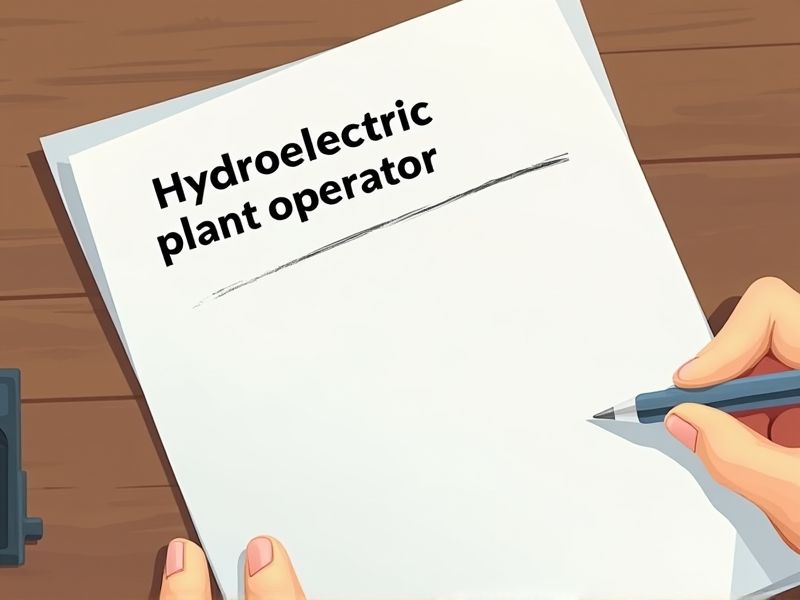
Hydroelectric plant operators are responsible for the regulation and maintenance of complex systems that generate renewable energy. Their work involves managing sophisticated machinery, which necessitates a deep understanding of safety protocols and operational procedures. Specialized certifications ensure operators possess the technical skills and knowledge required to prevent disruptions and ensure safe, efficient plant operations. Key certifications for hydroelectric plant operators include those in electrical safety, turbine technology, and environmental regulations.
State Certified Hydroelectric Plant Operator Certification
State Certified Hydroelectric Plant Operator Certification ensures operators understand and comply with strict environmental and safety regulations. Certification provides standardized knowledge essential for the efficient and safe operation of complex hydroelectric systems. Operators must demonstrate proficiency in skills that protect both public safety and the ecological balance affected by hydroelectric power generation. This certification acts as a benchmark for performance, ensuring all operators meet specific industry standards.
OSHA 10-Hour Safety Certification
The OSHA 10-Hour Safety Certification equips hydroelectric plant operators with essential knowledge to recognize and mitigate workplace hazards. This training reduces the likelihood of accidents and injuries by enforcing safety protocols in high-risk environments. Compliance with OSHA standards is necessary to avoid potential legal and financial repercussions for hydroelectric facilities. Enhanced safety awareness fosters a culture of prevention, indirectly boosting operational efficiency and reliability.
OSHA 30-Hour Safety Certification
Hydroelectric plant operators work in environments where the potential for accidents due to electrical hazards, heavy machinery, and water power exists, necessitating comprehensive safety training to mitigate risks. The OSHA 30-Hour Safety Certification equips operators with knowledge about recognizing and controlling workplace hazards. Regulations often require such certifications to ensure compliance with safety standards, promoting a culture of safety within the industry. Training helps reduce the likelihood of workplace incidents, thereby decreasing downtime and financial loss for the plant.
First Aid/CPR Certification
A hydroelectric plant operator may encounter emergency situations, such as electrical accidents, where immediate CPR can be vital in saving a life. Water-related incidents at the plant underscore the need for first aid skills to manage potential drowning risks effectively. A certified operator can also better support colleagues, enhancing overall workplace safety. Potential reductions in injury recovery times and legal liabilities may result from having CPR-certified personnel on site.
Electrical Safety (NFPA 70E) Certification
Electrical Safety (NFPA 70E) Certification is required for a hydroelectric plant operator to minimize the risk of electrical hazards, which are prevalent in environments handling high-voltage equipment. Implementing NFPA 70E standards ensures compliance with federal safety regulations, reducing potential legal liabilities for the plant. The certification provides operators with knowledge to effectively identify and manage electrical risks, enhancing overall workplace safety. With trained personnel, the plant can maintain operational efficiency while also prioritizing the well-being of its workforce.
Lockout/Tagout (LOTO) Certification
Lockout/Tagout (LOTO) certification is essential for hydroelectric plant operators because it ensures that all energy sources are properly isolated, preventing accidental releases during maintenance. This certification reduces the risk of injuries by ensuring that equipment cannot be inadvertently activated while being serviced. It guarantees compliance with occupational safety regulations, thereby minimizing legal liabilities for the plant. LOTO certification fosters a culture of safety, promoting a workplace environment where workers are trained to recognize and manage potential hazards effectively.
SCADA Systems Operation Certification
SCADA Systems Operation Certification ensures that hydroelectric plant operators can efficiently manage and monitor electrical and hydraulic systems, minimizing the risk of operational failures. By having certified operators, plants can maintain compliance with industry regulations, reducing potential liability issues. Certification equips operators with the necessary skills to quickly diagnose and resolve system anomalies, enhancing overall plant reliability. Employers in the hydroelectric sector often require certification as it demonstrates a commitment to safety and technical proficiency.
Hazardous Materials (HAZMAT) Awareness Certification
Hydroelectric plant operators frequently interact with materials that could pose risks to both human health and the environment, thereby necessitating HAZMAT Awareness Certification. This certification ensures operators are equipped with the knowledge to recognize hazardous substances and understand the protocols to manage any leaks or spills effectively, reducing potential harm. Proper awareness minimizes the risk of accidental exposure or contamination, ensuring the safety and operational integrity of the hydroelectric facility. Compliance with regulatory standards that require such awareness further protects the plant from legal and financial repercussions.
Emergency Response Certification
Hydroelectric plant operators must be equipped to handle unforeseen mechanical failures, which can endanger both plant safety and surrounding communities. Emergency response certification ensures operators are trained to effectively manage crises, such as floods or equipment malfunctions. In critical situations, timely and informed actions can prevent environmental damage and protect human lives. Regulatory compliance often mandates emergency preparedness training to maintain operational licenses and ensure adherence to safety standards.
Renewable Energy Professional (REP) Certification
The Renewable Energy Professional (REP) Certification enhances a hydroelectric plant operator's competency by ensuring they understand up-to-date renewable energy technologies and best practices. Employers value this certification as it often correlates with improved operational efficiency and safety standards. By having this certification, operators demonstrate their commitment to sustainable development and compliance with environmental regulations. Access to a network of certified professionals and continuous learning opportunities becomes more accessible, leading to further career advancement.
Summary
With certifications, you can expect to enhance your skills, leading to improved operational efficiency at the hydroelectric plant. This expertise can result in increased plant safety and reliability due to better handling of complex systems. Your qualifications may also promote career advancement and job security within the energy sector. Such recognition often boosts your competitive edge, making you a more valuable asset to employers.
